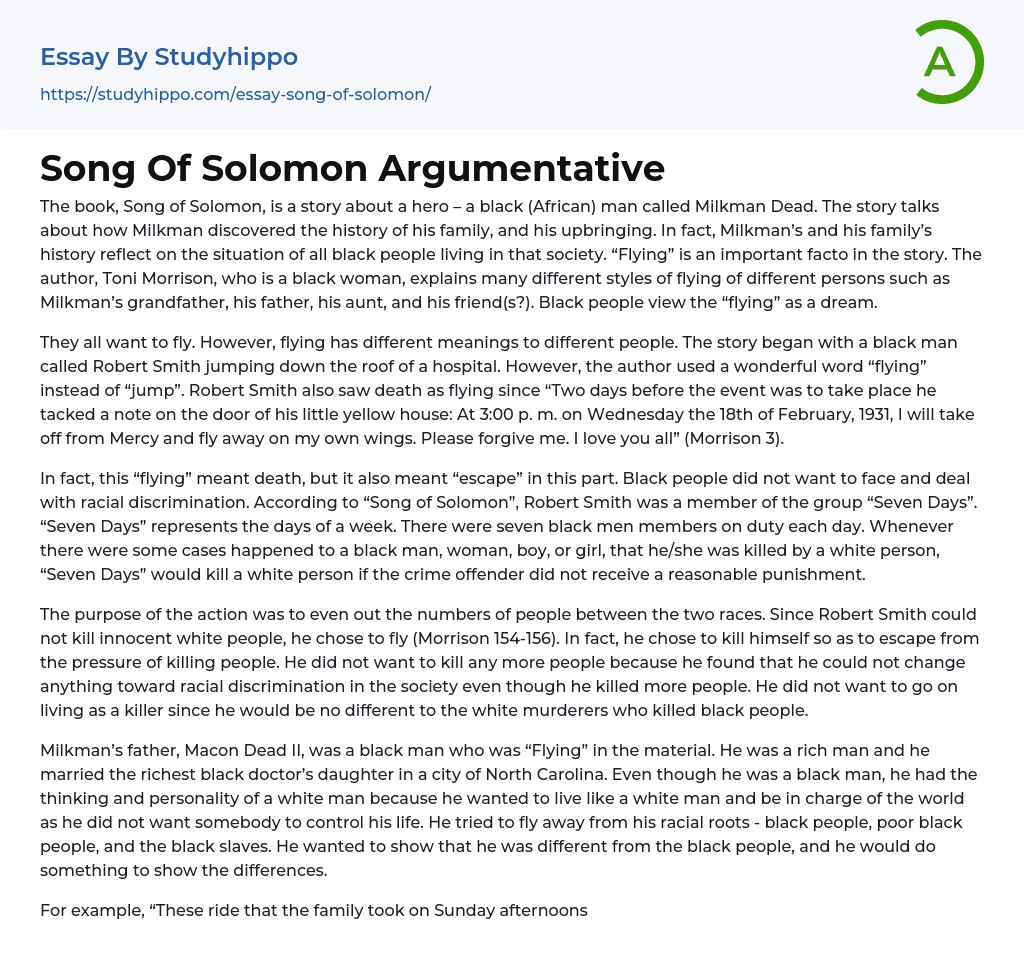Toni Morrison's Song of Solomon depicts African hero Milkman Dead's exploration of his family's history and his own upbringing, while also shedding light on the experiences of black individuals in society. The theme of "flying" carries significant meaning throughout the book, symbolizing different traits embodied by Milkman's grandfather, father, aunt, and friend(s?). Within the black community, "flying" represents a cherished aspiration.
The concept of flying is interpreted differently by individuals. The narrative revolves around Robert Smith, an African American man who leapt from a hospital roof. Interestingly, the author chooses to refer to this action as "flying" rather than "jumping." To Robert Smith, even death symbolizes flying. This is evident in a note he left at his residence, where he declares his intention to depart from Mercy and
...soar with his own wings on February 18, 1931 at 3:00 p.m. The note concludes with apologies and expressions of love for those he leaves behind (Morrison 3).
The act of "flying" in this area represented death and escape for black individuals trying to avoid racial discrimination. In "Song of Solomon," Robert Smith was a member of the group called the "Seven Days," symbolizing each day of the week. Every day, seven black men were on duty. If a white person unjustly killed a black individual without facing proper punishment, the "Seven Days" would seek retaliation by killing a white person.
The action's intention was to achieve racial balance by targeting individuals of different races. Instead of harming innocent white people, Robert Smith chose to end his own life in order to avoid the responsibility of taking other lives. He understood that
killing more individuals would not lead to any progress in society's fight against racial discrimination. He did not want to live as a murderer because that would place him on the same level as the white murderers who were responsible for killing black individuals.
Macon Dead II, the father of Milkman, was a wealthy black man who sought to acquire a materialistic lifestyle. Despite his race, he adopted white ideals and traits. He aimed to emulate the lives of white individuals and exert authority over his own existence, rejecting subordination to others. His goal was to separate himself from his racial heritage, including impoverished black individuals and enslaved blacks. It was crucial for him to highlight his differences from other black people, leading him to engage in activities that showcased these distinctions.
The rides that the family took on Sunday afternoons had become important rituals for Macon. They were a way for him to satisfy himself that he was successful. He never stopped seeking wealth and even asked his son to steal his sister's gold. He told him, "Macon, get it and you can have half of it; go wherever you want. Get it. For both of us. Please get it, son. Get the gold." Milkman's friend Guitar Bains was a black man belonging to the lower class of society.
In comparison to Milkman's life, the poor black man had a completely different experience. His ability to fly was seen as extraordinary. Despite lacking money and authority, he chose to join the "Seven Days" organization with the intention of making a positive impact on the lives of black individuals. He explained to
Milkman that his motivation for joining was to assist fellow black people. His aim was to bring about change in the lives of black individuals by emphasizing their connection with their history of suffering, which included the bloodshed experienced by both African and Native American peoples.
Morrison (158) states that if the issues persist, there will be no solution and no land left for those who survive. Hence, it is crucial to maintain the current population figures. Milkman Dead III, an African American with a privileged background, expressed his desire for freedom and fulfillment by his ability to "fly." Growing up in this setting led him to lose interest in other pursuits as he aimed to imitate his father's way of life. However, during his quest to uncover his family's past, he discovered what truly mattered.
In the beginning, he did not like his family name, but eventually, he became proud of it. He gained knowledge about his family's past through Susan Ryan's tales and songs. His great-grandfather, Solomon, was a black man who possessed the incredible ability to fly. Solomon brought his 21st son, Jack, along during one of his flights. Unfortunately, Jack was lost during the journey, while Solomon left his wife behind on the ground. Solomon then flew back to Africa, the birthplace of black people. Jack, his son, went on to marry an Indian woman and became the father of Milkman's father, Macon Dead.
This narrative depicts the experiences of African Americans in the United States. Their enduring desire to fly symbolizes their longing to escape the oppressive bonds of slavery. In the closing pages of the book,
Toni Morrison asserts that "if you surrendered to the air, you could ride it" (Morrison 337), indicating her yearning for a return to humanity's inherent innocence. Morrison employs Milkman's ultimate "flight" as a metaphor for the liberation of the human spirit, representing a boundless and unrestricted freedom.
- Walk This Way essays
- Song Analysis essays
- Black People essays
- Band essays
- Baroque Music essays
- Blues essays
- Classical Concert essays
- Classical Music essays
- Concert essays
- Hip Hop essays
- Jazz essays
- Ludwig Van Beethoven essays
- Michael Jackson essays
- Mp3 essays
- Music Concert Report essays
- Music Reference essays
- Music video essays
- Musical Instruments essays
- Opera essays
- Piano essays
- Popular music essays
- Recording essays
- Rock And Roll essays
- Rock Music essays
- Singing essays
- Sonata essays
- Song essays
- Sonnet essays
- Tupac shakur essays




